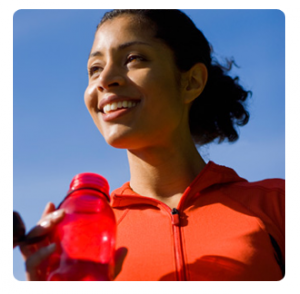4 Key moments in Hydration
Any moment is good to take hydration into account, but here we propose four particular times when hydration needs should be specially considered: when studying, when driving, when performing physical activity and at work.
Studying

The performance of both physical and mental tasks can be adversely influenced by heat and by dehydration. The loss of even 1-2% of body weight – from about 500 mL to about 2 litres can make people feel less alert, less able to concentrate, and more tired. It can also increase the level of headache symptoms. Ensuring that we stay well hydrated allows the body to self-regulate and there is some evidence that it can reduce the severity of headache, tiredness and loss of concentration symptoms. This is clearly crucial when there is a need to concentrate on studying and learning.
Driving and hydration
 Dehydration can cause headaches, tiredness and loss of concentration, affecting mental alertness. Driving in a hot car can lead to sweating with large losses of water and mineral salts or electrolytes. Even in an air conditioned car, water losses can be high on a long drive. Convenient hydration while driving is needed. Frequent drinks of non-alcoholic beverages during a long automobile trip may help to reduce road fatigue.
Dehydration can cause headaches, tiredness and loss of concentration, affecting mental alertness. Driving in a hot car can lead to sweating with large losses of water and mineral salts or electrolytes. Even in an air conditioned car, water losses can be high on a long drive. Convenient hydration while driving is needed. Frequent drinks of non-alcoholic beverages during a long automobile trip may help to reduce road fatigue.
Physical activity
 by drinking sufficient amounts of beverages or sports drinks both during and prior to sports activities when water loss is expected to occur. Sports drinks provide fluids, electrolytes and carbohydrates. During exercise, drinking should occur regularly, but the frequency of drinking and the amount consumed will depend on many factors, including the intensity and duration of exercise and the weather conditions, as well as on the physical characteristics of the individual, including body weight and individual sweating characteristics. In very hot and humid climates, outdoor sports should be performed in the early morning or late afternoon, and it is best to avoid unnecessary physical exertion during the hottest times of the day.
by drinking sufficient amounts of beverages or sports drinks both during and prior to sports activities when water loss is expected to occur. Sports drinks provide fluids, electrolytes and carbohydrates. During exercise, drinking should occur regularly, but the frequency of drinking and the amount consumed will depend on many factors, including the intensity and duration of exercise and the weather conditions, as well as on the physical characteristics of the individual, including body weight and individual sweating characteristics. In very hot and humid climates, outdoor sports should be performed in the early morning or late afternoon, and it is best to avoid unnecessary physical exertion during the hottest times of the day.
When exercising for short periods or at low intensities, it may not be necessary to drink anything: water is perfectly adequate in these situations if something is needed. For reasons of variety and taste sports drinks may be preferred in this situation. When the exercise lasts longer than about 30-40 minutes, sports drinks may be better than water. One key benefit is that they can reduce the sensation of effort. This makes exercise seem easier and this means that the individual will be more likely to enjoy the exercise program and therefore more likely to stick with it.
Physical work performance is usually decreased when dehydration exceeds about 1-3% of body weight. Prolonged exercise in the heat with dehydration corresponding to a loss of only 1% of body weight increases body temperature, which is a consequence of both reduced sweating and reduced skin blood flow induced by dehydration. A body water loss of more than about 2% induced by exercise in the heat has been shown to impair performance in a wide variety of tests of both physical and mental performance. Young children and adolescents may be at particular risk of impaired cognitive function (concentration, alertness and short-term memory) due to insufficient hydration.
At work

Particularly when performing physical work, sweat output often exceeds water intake, producing a body water deficit or dehydration. In these situations, dehydration can adversely affect worker productivity, safety and morale because mental performance can be reduced as well as physical performance. Hydration is therefore just as important for the office worker as it is for the manual worker.
For those who work in an office with air conditioning, the atmosphere has a low water content resulting in increased losses of water from the lungs and through the skin. These losses need to be replaced through a rich and varied diet including foods and drinks with a high level of water content. Not being well hydrated during the working day can cause headaches, tiredness and loss of concentration.